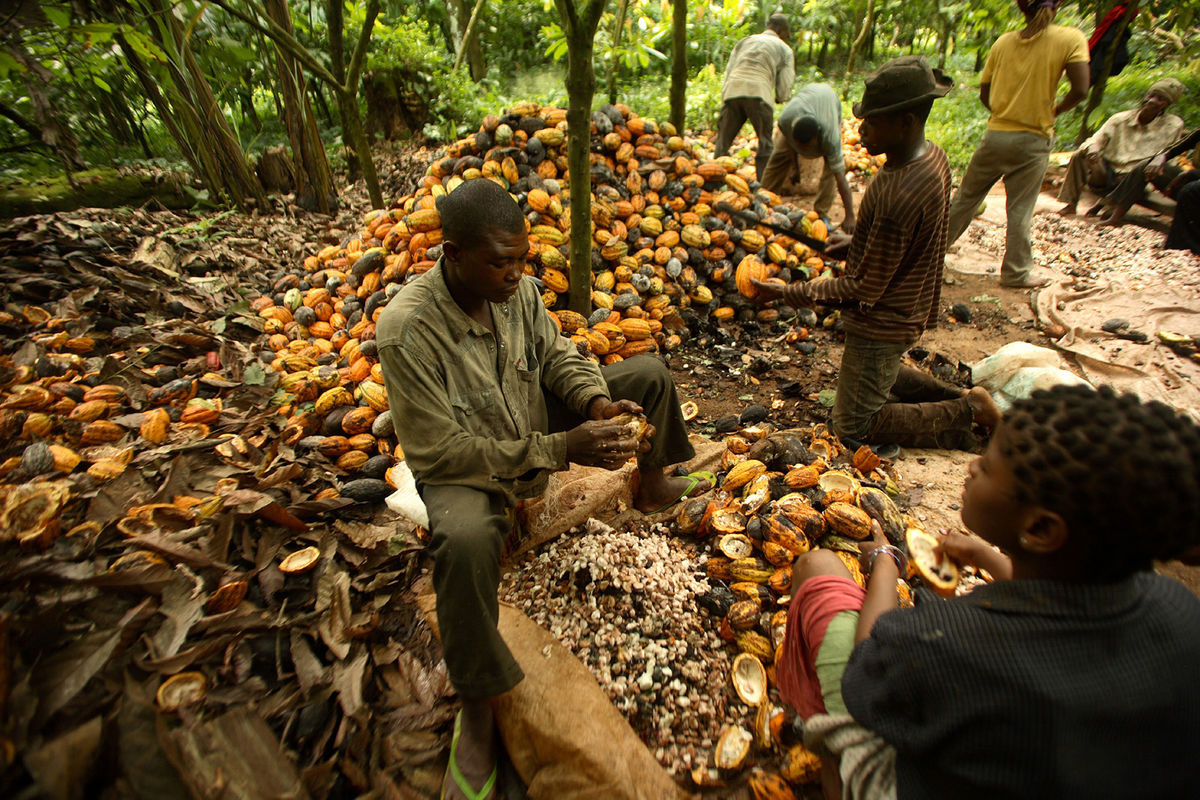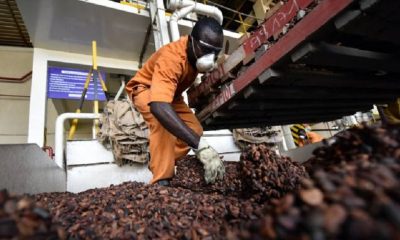Economy
CFAN to Collect Bio-data of Cocoa Farmers

By Adedapo Adesanya
President of the Cocoa Farmers Association of Nigeria (CFAN), Mr Adeola Adegoke, has said the group would soon start collecting bio-data from all cocoa farmers in the country.
Mr Adegoke said this task would be done in collaboration with the cocoa value-chain stakeholders across the cocoa-producing states and cocoa communities’ traditional leaders.
According to him, this would enable the investors, policymakers, and other relevant stakeholders to know all the information they need about their cocoa beans, cocoa plantation environment, inputs/GAP, and activities in cocoa plantations.
Speaking on Thursday at the first National Cocoa Festival tagged Stakeholders’ Collaboration To Make Nigeria Cocoa Industry Sustainable in Ondo State, the CFAN leader urged members of the association who have received bank loans to repay fully without any further delay to sustain the Central Bank of Nigeria (CBN) and other financial partners’ support for the cocoa production sub-sector.
Mr Adegoke said this was the only way to guarantee the continuity of such programmes and to sustain support for the cocoa industry.
At the event, the Minister of Agriculture and Rural Development, Mr Muhammed Abubakar, said the country was positioning itself to regain a top-tier spot in cocoa production.
He informed the gathering that in the first quarter of this year, Nigeria earned N122.89 billion from the export of raw cocoa beans and cocoa products.
“It is now obvious that Nigeria cannot continue to rely on crude oil to develop economically, going by the instability of crude oil prices due to the Russian-Ukraine war,” he said.
He reiterated the need for the federal government’s commitment to supporting the agricultural sector to diversify the economy, especially in the area of an increase in cocoa production.
According to him, the changing economic landscape has made diversification a top priority, ensuring that Nigeria regains its position as one of the highest cocoa-producing countries in the world.
Mr Abubakar, represented by the ministry’s South-West Zonal Director, Mrs Omolara Abimbola-Oguntuyi, maintained that agriculture holds the key to the collective survival as a people, both in terms of job creation, income generation, food, and nutritional security, as well as foreign exchange earnings.
On his part, the Ondo State Governor, Mr Rotimi Akeredolu, said the state government would continue to provide an enabling environment for businesses to strive in the state.
Mr Akeredolu, represented by his Senior Special Assistant on Agric and Agribusiness, Akin Olotu, urged the stakeholders across the states to support cocoa production in the country.
The Ooni of Ife, Mr Enitan Adeyeye Ogunwusi, was decorated as the Grand Patron of CFAN. He said that to make Nigeria’s cocoa industry sustainable, all cocoa-producing states must contribute to the country’s cocoa production development.
Economy
Seven Price Gainers Boost NASD OTC Bourse by 2.19%

By Adedapo Adesanya
Seven price gainers flipped recent declines at the NASD Over-the-Counter (OTC) Securities Exchange, raising the alternative stock market by 2.19 per cent on Friday.
According to data, the market capitalisation added N51.24 billion to end N2.389 trillion compared with the previous day’s N2.338 trillion, while the NASD Unlisted Security Index (NSI) climbed 85.65 points to close at 3,994.32 points, in contrast to the 3,908.67 points it ended a day earlier.
Business Post reports that the advancers were led by MRS Oil Plc, which improved its value by N13.00 to N200.00 per share from N187.00 per share, FrieslandCampina Wamco Nigeria Plc gained N7.40 to settle at N91.55 per unit versus the previous day’s N84.15 per unit, Central Securities Clearing System (CSCS) Plc appreciated by N6.08 to N71.00 per share from N64.92 per share, Afriland Properties Plc added 66 Kobo to finish at N17.17 per unit versus N16.51 per unit, IPWA Plc rose 37 Kobo to N4.15 per share from N3.78 per share, First Trust Mortgage Bank Plc grew by 11 Kobo to N1.20 per unit from N1.09 per unit, and Food Concepts Plc went up by 10obo to N3.70 per share from N3.60 per share.
On the flip side, there were two price losers led by Geo-Fluids Plc, which depreciated by 28 Kobo to N3.32 per unit from N3.60 per unit, and Industrial and General Insurance (IGI) Plc dropped 5 Kobo to sell at 45 Kobo per share from 50 Kobo per share.
Yesterday, the volume of trades went down by 92.0 per cent to 3.7 million units from 45.8 million units, the value of transactions fell by 59.4 per cent to N84.5 million from N208.2 million, while the number of deals went up by 7.7 per cent to 42 deals from 39 deals.
CSCS Plc remained the most traded stock by value (year-to-date) with 32.6 million units exchanged for N1.9 billion, trailed by Geo-Fluids Plc with 119.6 million units valued at N470.3 million, and Resourcery Plc with 1.05 billion units traded at N408.6 million.
Resourcery Plc closed the day as the most traded stock by volume (year-to-date) with 1.05 billion units sold for N408.7 million, followed by Geo-Fluids Plc with 119.6 million units worth N470.3 million, and CSCS Plc with 32.6 million units worth N1.9 billion.
Economy
FX Demand Worries Weaken Naira to N1,346/$1 at Official Market

By Adedapo Adesanya
The Naira weakened further against the United States Dollar in the Nigerian Autonomous Foreign Exchange Market (NAFEX) on Friday, February 20, by N4.97 or 0.37 per cent to N1,346.32/$1 from the N1,341.35/$1 it was transacted on Thursday.
Heightened FX demand tilted the market toward the downside yesterday, exerting upward pressure on rates despite efforts by the Central Bank of Nigeria (CBN) to stabilise the foreign exchange market.
Also in the official market, the domestic currency depreciated against the Pound Sterling during the session by N9.39 to sell for N1,815.25/£1 versus the previous day’s N1,805.86/£1, and lost N7.33 against the Euro to close at N1,584.62/€1 compared with the preceding session’s N1,577.29/€1.
The story was not different for the Nigerian Naira at the GTBank FX desk, where it depleted against the Dollar by N7 on Friday to quote at N1,356/$1 versus the N1,349/$1 it was sold a day earlier, but remained unchanged in the black market at N1,370/$1.
It was observed that risky sentiment among Foreign Portfolio Investors (FPIs) contributed to the FX market, amid fears of hot money flight due to capital gains tax and other factors.
As for the cryptocurrency market, it was mostly green yesterday in reaction to a Supreme Court verdict dismissing a fresh 10 per cent global levy by President Donald Trump.
The apex court on Friday described Mr Trump’s global tariff rollout as illegal. The decision did not clarify what should happen to tariff revenue already collected, and it doesn’t necessarily spell the end of the trade agenda, with multiple legal and executive avenues still available.
Litecoin (LTC) grew 2.7 per cent to $55.00, Cardano (ADA) appreciated 2.6 per cent to trade at $0.2815, Binance Coin (BNB) expanded by 2.6 per cent to $627.19, Dogecoin (DOGE) recouped 1.3 per cent to quote at $0.1, Ripple (XRP) jumped 0.7 per cent to $1.43, Solana (SOL) improved by 0.5 per cent to $84.15, and Ethereum (ETH) soared 0.1 per cent to $1,962.78.
However, Bitcoin (BTC) lost 0.2 per cent to sell for $67,850.49, while the US Dollar Tether (USDT) and the US Dollar Coin (USDC) traded flat at $1.00 each.
Economy
Fidson, Jaiz Bank, Others Keep NGX in Green Territory

By Dipo Olowookere
A further 0.99 per cent was gained by the Nigerian Exchange (NGX) Limited on Friday after a positive market breadth index supported by 53 price gainers, which outweighed 23 price losers, representing bullish investor sentiment.
During the trading day, the trio of Jaiz Bank, Fidson, and NPF Microfinance Bank chalked up 10.00 per cent each to sell for N11.00, N86.90, and N6.27, respectively, while Deap Capital appreciated by 9.96 per cent to N7.62, and Mutual Benefits increased by 9.94 per cent to N5.42.
Conversely, Secure Electronic Technology shed 10.00 per cent to trade at N1.62, Sovereign Trust Insurance slipped by 9.73 per cent to N2.32, Ellah Lakes declined by 7.91 per cent to N12.80, International Energy Insurance retreated by 5.56 per cent to N3.40, and ABC Transport moderated by 5.26 per cent to N9.00.
Data from Customs Street revealed that the insurance counter was up by 2.52 per cent, the industrial goods sector grew by 2.28 per cent, the banking space expanded by 1.43 per cent, the consumer goods index gained 1.23 per cent, and the energy industry rose by 0.05 per cent.
As a result, the All-Share Index (ASI) went up by 1,916.20 points to 194,989.77 points from 193,073.57 points, and the market capitalisation moved up by N1.230 trillion to N125.164 trillion from Thursday’s N123.934 trillion.
Yesterday, investors traded 820.5 million stocks valued at N28.3 billion in 63,507 deals compared with the 898.5 million stocks worth N38.5 billion executed in 61,953 deals, showing a jump in the number of deals by 2.51 per cent, and a shortfall in the trading volume and value by 8.68 per cent and 26.49 per cent apiece.
Closing the session as the most active equity was Mutual Benefits with 79.0 million units worth N427.1 million, Zenith Bank traded 44.0 million units valued at N3.8 billion, Chams exchanged 43.9 million units for N182.0 million, AIICO Insurance transacted 42.4 million units valued at N179.8 million, and Veritas Kapital sold 36.0 million units worth N90.6 million.
-

 Feature/OPED6 years ago
Feature/OPED6 years agoDavos was Different this year
-
Travel/Tourism10 years ago
Lagos Seals Western Lodge Hotel In Ikorodu
-

 Showbiz3 years ago
Showbiz3 years agoEstranged Lover Releases Videos of Empress Njamah Bathing
-

 Banking8 years ago
Banking8 years agoSort Codes of GTBank Branches in Nigeria
-

 Economy3 years ago
Economy3 years agoSubsidy Removal: CNG at N130 Per Litre Cheaper Than Petrol—IPMAN
-

 Banking3 years ago
Banking3 years agoSort Codes of UBA Branches in Nigeria
-

 Banking3 years ago
Banking3 years agoFirst Bank Announces Planned Downtime
-

 Sports3 years ago
Sports3 years agoHighest Paid Nigerian Footballer – How Much Do Nigerian Footballers Earn














1 Comment